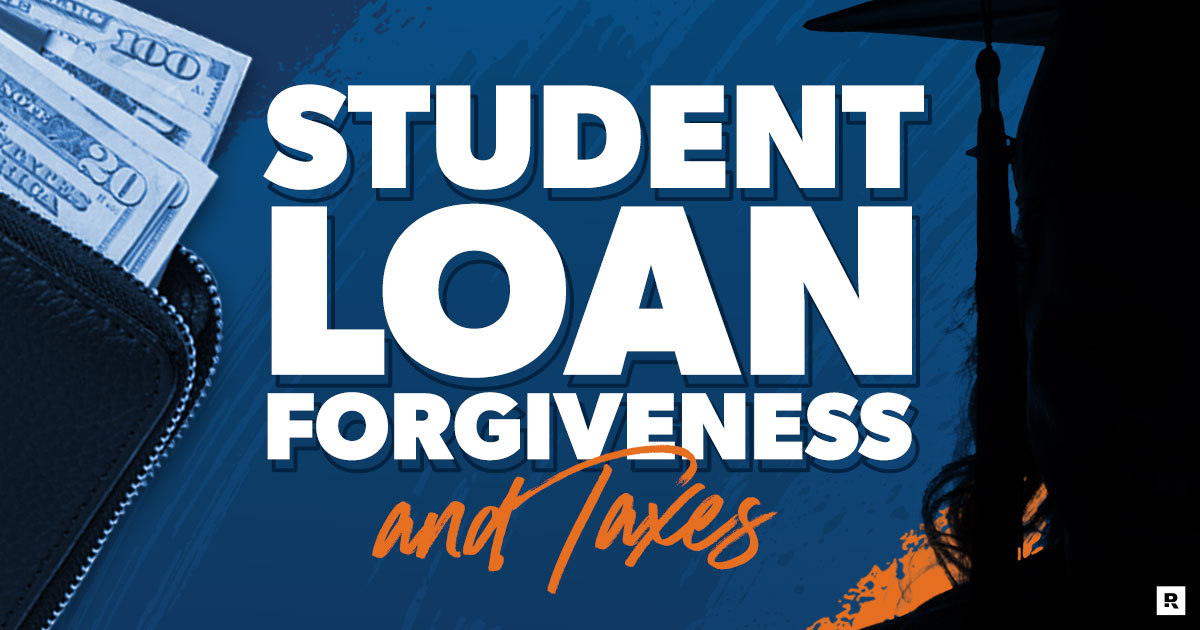In case you missed it, President Biden unveiled his plan to forgive $10,000–20,000 of student loan debt for millions of Americans sometime in the near future.1
According to the White House, borrowers who make less than $125,000 each year ($250,000 for married couples) will qualify to have at least some of their student loan debt wiped out.2
This is a big deal. After all, this is the first time there’s been student loan cancellation of this scale (the latest estimates show this move will cost about $300 billion—maybe more). Keep in mind that Biden’s plan isn’t guaranteed yet—and there could be legal challenges on the way to prevent this from happening.3
And while the president’s student loan forgiveness plan comes with lots of questions attached, there’s one big question we need to tackle as all of this sinks in: How does student loan forgiveness affect your taxes?
Well, just like with anything else that has to do with taxes, the answer is a little complicated. So, let’s get right to it!
Student Loan Forgiveness and Your Taxes
As a general rule, any kind of debt that’s forgiven or reduced by the government—including student loan debt—is considered taxable income.4 That means, in most cases, you’ll have to pay income taxes on the amount of tax relief you get. For example, if you make $40,000 a year and the government cancels $5,000 of debt you owe, you now have $45,000 in taxable income.
Get expert money advice to reach your money goals faster!
But the American Rescue Plan of 2021 changed all that for student loans. That law made student loan forgiveness federally tax-free until 2026—and it covers Biden’s forgiveness plan too.5
Here’s the bottom line: Any debt relief from President Biden’s student loan forgiveness plan will not be treated as taxable income on your federal tax return. So when you sit down to file your taxes, you won’t really notice anything different.
That’s the good news. But notice how the law only applies to taxes at the federal level. What about at the state level? That’s where things get a little tricky.
You Might Owe State Taxes on Student Loan Debt Relief
Depending on what state you live in, your forgiven student loans might be taxed as income. Why? Because as you’re reading this, a handful of states are still on track to count canceled student loan debt as taxable income since they haven’t updated their laws to match federal law (more on that in a minute).
According to the latest analysis from the Tax Foundation, here are seven states that might tax your student loan debt relief if it ever comes:
- Arkansas
- California
- Indiana
- Minnesota
- Mississippi
- North Carolina
- Wisconsin6
So, how much could you owe on your state tax bill thanks to student loan forgiveness? It depends, because each state taxes income differently. But if you receive the max amount of debt relief from Biden’s plan, you could be looking at an extra $500–1,570 on your state tax bill sometime soon.
But hold your horses. While these states might go ahead and tax student loan forgiveness, there’s still a chance for policy changes at the state level. To explain how all this stuff works, it’s time for a quick civics lesson on the relationship between federal and state tax. Hang with us here!
You see, some states automatically update their tax legislation to match federal laws whenever they change—this is called rolling conformity, and folks in those states probably won’t have to pay state income tax on their student loan forgiveness either.
But other states only conform to the federal tax code from a certain date (also known as static or fixed-date conformity) or pick and choose which federal laws to conform to as they go (selective conformity). Many of the states in those camps have already gone ahead and updated their laws to exclude student loan forgiveness from being taxed.
But those other five states we listed above? They’ll need to update their laws soon if they want to exclude student loan debt relief from being counted as taxable income. Stay tuned!
Will Student Loan Payment Refunds Be Taxed?
Now that Biden appears to be forgiving thousands of dollars in student loan debt, a lot of folks are asking for refunds on student loan payments they made during the pandemic.
If you do decide to get a refund, remember that your loan balance will revert back to whatever amount you get back from your loan provider. Whatever you do, don’t spend a dime of that refund until your loan forgiveness goes through. Keep that money in savings . . . just in case.
But will a student loan payment refund count toward your taxes? Probably not. You won’t be taxed on refunds of federal student loan payments made during the pandemic since that’s considered student loan relief (which is federally tax-free until 2026). But again, your state might treat those refunds as taxable income—so, beware!
Talk With Your Tax Pro
Long story short, if you live in a state that might tax your student loan forgiveness, you need to keep a close eye on what your state legislature does next. And more importantly, make sure you talk with your tax professional before you sit down to file your taxes—they can help you understand what to expect.
Don’t have a tax pro in your corner? Our tax Endorsed Local Providers (ELPs) can help. They’re RamseyTrusted and they stay on top of all the latest tax laws in your state so you can be up to speed on how student loan forgiveness will affect your tax bill.



